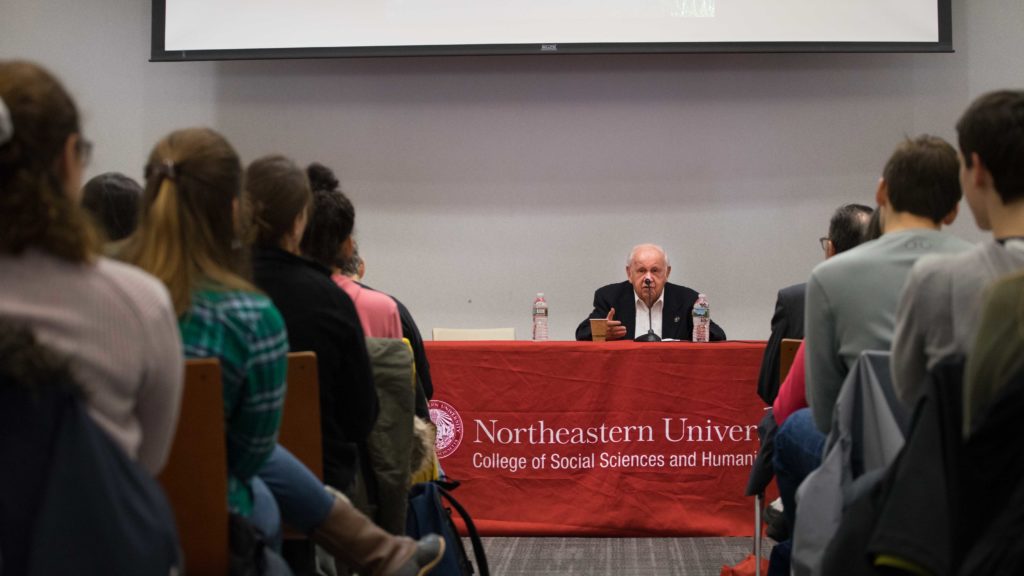By Janette Ebbers, news correspondent
Northeastern hosted Holocaust Awareness week to commemorate the World War II genocide with multiple events focused on the its history and connections to the present.
The weeklong series of events features student and faculty speakers and integrates multimedia presentations, including a Wednesday movie screening of “What Our Fathers Did: A Nazi Legacy.”
President Joseph E. Aoun gave a speech to kick off the week’s first event on Monday and said the week was “needed more than ever” in light of the current political climate.
“We are seeing in our society the rise of anti-Semitism, the rise of exclusion” Aoun said. “Our role, our duty, our responsibility is to make sure it doesn’t happen anywhere. No one should be judged on race, or ethnicity, or religion, or sexual orientation—and that’s happening. And it’s happening more and more.”
The week of events is connected to the Holocaust in a more concrete sense as well; many of the week’s speakers, including professors Rose Zoltek-Jick and Lori Hope Lefkovitz, have parents who were survivors of the Holocaust.
Zoltek-Jick, a School of Law professor and the main speaker at Monday’s event, drew parallels between the Holocaust and the present day, highlighting patterns of dehumanization.
“We are now living in a moment where the fragility of democracy and the rule of law is very much in the air, and very much on our minds,” Zoltek-Jick said. “The threat comes from both fanaticism, that can’t tolerant difference, and from authoritarianism, which cannot tolerate dissent […] It’s a world where othering—putting people and demonizing them in groups and losing any sense of the humanity of one’s fellow, individual by individual—is happening.”
Lefkovitz, the director of the Jewish studies program, spoke on the importance of Holocaust studies to prevent future disasters.
“Research into and memorializing the past must help us strengthen our appreciation for the fragility and value of democratic institutions, and therefore enforce a general will to thwart genocidal impulses,” said Lefkovitz, who is also the director of the Humanities Center and an English professor.
On Thursday, prominent international lawyer Philippe Sands will deliver a lecture on genocide and crimes against humanity, which is free and will take place in the Raytheon Amphitheater on Leon Street.
Anna Tobin, a freshman journalism major, said she felt this weeklong awareness program was a perfect way to educate the public.
“I believe a week like this is the perfect way to kind of set aside time to reflect and re-educate refresh everybody on what it was like and what kind of effect it had on our culture,” Tobin said.
Laurel Leff, associate professor of journalism and member of the Holocaust Awareness Week Committee, said the personal connections of the speakers to the Holocaust were particular strengths of the program.
“People who went through this experience, or whose parents went through this experience, or who have studied this experience, have an additional obligation to look at current world situations and say, ‘Are there parallels?’” Leff said. “What are the parallels, how do the parallels work, what does that mean for how we should move forward?”
Zoltek-Jick said she knows not to take anything for granted in the current political climate.
“Across the globe, survivor children living in the diaspora are asking ourselves: Is this the moment our parents failed to see? What are we seeing? What are we missing?” Zoltek-Jick said. “This moment may not be that one, but we’re wondering, and we’re worried.”
Photo by Alex Melagrano















